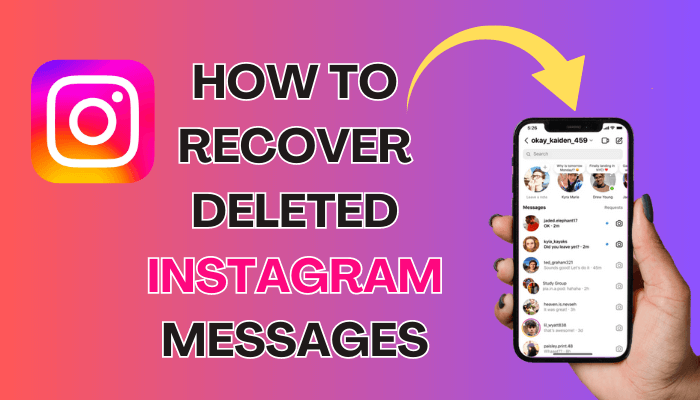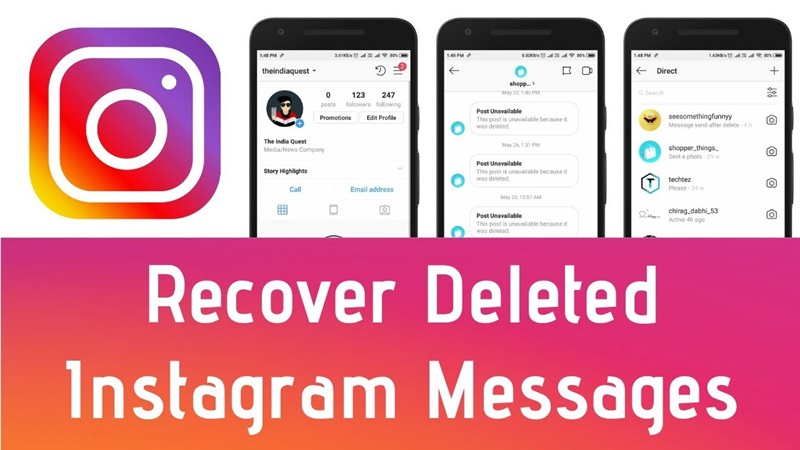If you’ve accidentally deleted a message or conversation on Instagram and wish to recover it, there are a few steps you can follow. Firstly, you need to verify if the messages are archived or completely deleted. Instagram, by default, archives all the deleted messages. To check this, go to your profile and click the three horizontal lines at the top right corner.
Then, select «Settings,» followed by «Privacy» and «Story.» Click on the «Keep in Chat» option to view the archived messages. However, if the messages are permanently deleted, you will need to use a third-party application to recover them. Before proceeding with this, it’s essential to know that such applications may compromise your privacy and security. Therefore, ensure that you use a reputable app and follow their instructions correctly. Remember that once a message is deleted from Instagram’s servers, it cannot be retrieved. Therefore, it’s always advisable to back up your data regularly to avoid losing any important conversations or files.
Three Methods to Retrieve Deleted Instagram Messages
When it comes to retrieving deleted Instagram messages, there are three main methods that can be employed. The first method involves using the Instagram Data Download tool, which is available in the application’s settings. By requesting your data, you can receive a file containing all of your past interactions, including deleted Direct Messages. This process can take up to 48 hours, so patience is required.
The second method is by using a third-party application or software. Several software solutions have been developed over the years that can help recover deleted Instagram messages. They work by scanning and retrieving data from your phone’s storage. However, when using these programs, you must take into account their reliability and the potential risk to your privacy.
Lastly, the third method to recover deleted Instagram messages is by contacting the Instagram Help Center. In some cases, they may be able to assist in the recovery of lost messages. However, this solution is not guaranteed as Instagram states in their policies that users are responsible for the content they choose to delete.
In conclusion, while it is possible to retrieve deleted Instagram messages, the process can be complex and time-consuming. It’s always crucial to think twice before deleting any important messages to avoid the hassle of recovery.

FAQs About Deleted Instagram Messages
Instagram users often have a myriad of questions about deleted Instagram messages. One common query is whether or not you can recover deleted messages. Unfortunately, you cannot retrieve deleted Instagram messages unless you’ve previously backed them up. Another frequent question is if the other person is notified when you delete a message.
The answer is no, Instagram does not send a notification if you remove a message. However, if they’ve already seen the message, they will know that it’s been deleted if they try to view it again. Users also wonder if Instagram stores deleted messages. The platform does keep deleted messages on their server for an unspecified period, but they’re not accessible to users. Questions also arise about how long Instagram keeps deleted messages.
While there is no public information available on the exact duration, it is known that Instagram does not hold onto them indefinitely. Lastly, users often ask if the deletion of messages can affect their account status or if it could be considered a breach of privacy. In response, it’s imperative to note that deleting your own messages is entirely within your control and doesn’t infringe on any Instagram policies. However, respecting the privacy of others and not sharing messages without consent is an important principle to adhere to when using any social media platform.
Reconnecting with Deleted Conversations
Reconnecting with deleted conversations can often feel like unearthing a hidden treasure chest of memories, emotions, and past experiences. It’s like stepping into a time machine and being transported back to the moment those words were exchanged. This could be a delightful journey, full of nostalgia and reminiscence, especially if the conversations were with loved ones who are no longer in our lives. It can bring back a sense of warmth and familiarity that may have faded with time.
On the flip side, it can also be a painful process, filled with regret and sorrow, particularly if the discussions were about difficult topics or were with individuals who caused us distress. It’s like reopening an old wound, which can be emotionally draining and distressing.
In the digital world, we often delete conversations to preserve our mental health, to move on from past relationships, or simply to declutter our inboxes. However, sometimes we may feel the need to revisit these deleted exchanges for closure or clarity. In such cases, various online platforms provide options to restore or recover deleted conversations, provided certain conditions are met.
Yet, it’s essential to bear in mind that reconnecting with deleted conversations should be done responsibly and ethically, respecting the privacy and consent of all parties involved. It’s also important to consider the emotional implications of revisiting these conversations and to ensure that it does not negatively impact our mental health.
In conclusion, reconnecting with deleted conversations can be both a precious walk down memory lane and a painful ride into the past. It’s a decision that requires careful consideration and should be made with respect for others and oneself. It’s an intricate dance between the need for closure, the respect for privacy, and the desire to move forward.

Explore Related Content
Exploring related content is an effective strategy to expand one’s understanding and knowledge about a specific topic. This process involves delving deeper into the subject matter by looking at its different aspects, dimensions, and perspectives. It’s like piecing together a puzzle – each piece of related content adds more detail and context, making the overall picture clearer and more comprehensive.
For instance, if one is researching about climate change, exploring related content could mean studying its causes, effects, and the different methods used to mitigate it. This could involve reading scientific research papers, watching documentaries, or listening to podcasts.
What’s more, exploring related content can also lead to discovering new interests and passions. It opens up a world of possibilities for learning, where one topic leads to another, creating a web of interconnected information. It’s an educational journey that stimulates curiosity and fosters lifelong learning.
Moreover, it helps in building a well-rounded perspective. When you explore related content, you expose yourself to different views and arguments on the same topic. This can lead to a more balanced and nuanced understanding, allowing you to form your own informed opinion or stance.
In the digital age, exploring related content has become more accessible than ever. The internet is a treasure trove of information, with various platforms and tools available to aid in this exploration. Search engines, online databases, and social media platforms often provide suggestions for related content, making it easier for users to delve deeper into topics that interest them.
However, with the vast amount of information available, it’s important to ensure that the related content being explored is credible and reliable. One should be discerning and critical in evaluating the sources of information to avoid misinformation or bias.
Overall, exploring related content is a powerful tool for learning and growth. It not only deepens understanding but also fosters curiosity, critical thinking, and open-mindedness.

Enhance Your Digital Presence
In today’s techno-centric world, enhancing your digital presence is crucial for success in both personal and professional spaces. It involves developing a solid online identity that effectively communicates your brand or persona to your target audience. This can be achieved through various strategies, such as content creation, search engine optimization, social media marketing, and online reputation management. First, creating engaging, valuable content is key in attracting and retaining online users’ attention.
This could range from blog posts and articles to videos and podcasts. Next, search engine optimization (SEO) helps improve your visibility on search engine results, making it easier for potential customers or followers to find you. Social media marketing, on the other hand, leverages platforms like Facebook, Instagram, Twitter, and LinkedIn to reach a wider audience, engage with them, and build strong relationships. Lastly, online reputation management involves monitoring and influencing how you or your business is perceived online.
This could involve addressing negative reviews or feedback, promoting positive achievements, and maintaining consistency in your online messaging and branding. All these strategies, when executed well, can significantly enhance your digital presence and position you or your business for greater success online. Remember, the digital world moves fast, so it’s important to stay updated with the latest trends, technologies, and best practices. Whether you’re an individual seeking to build a personal brand, a small business owner looking to attract more customers, or a large corporation aiming to maintain a strong online reputation, enhancing your digital presence is a vital step towards achieving your goals in the digital age.
